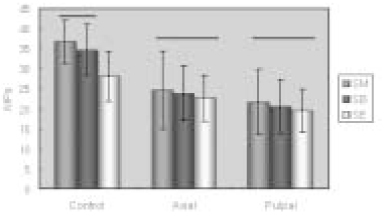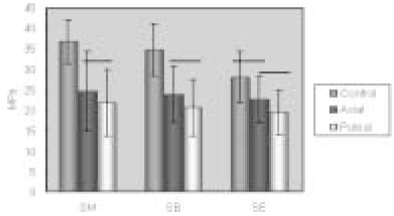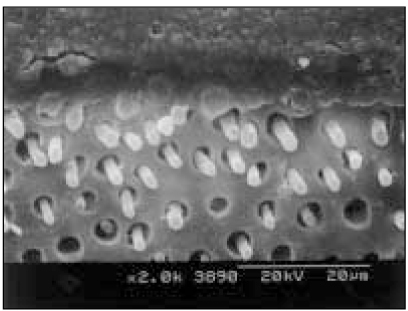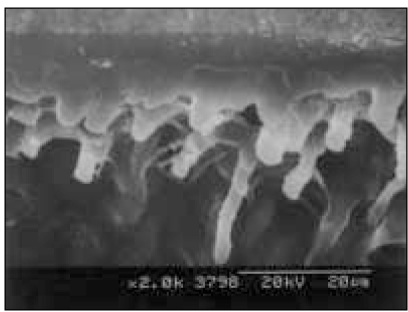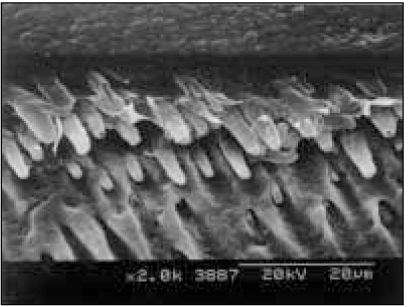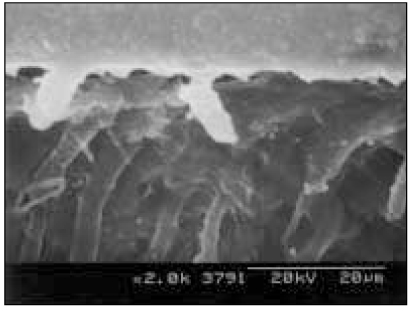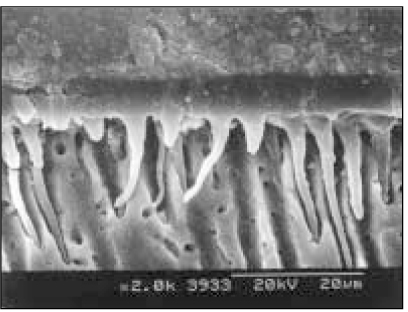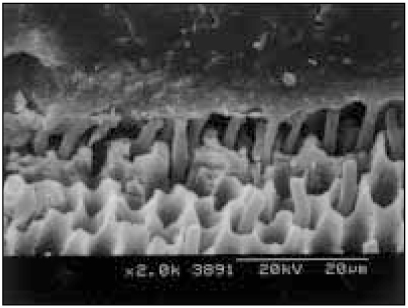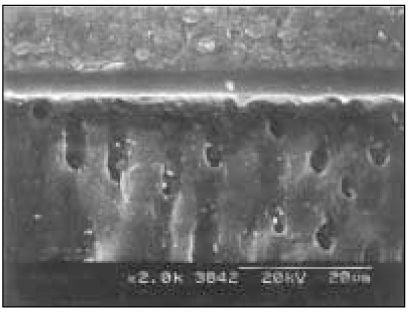J Korean Acad Conserv Dent.
2004 Jan;29(1):13-22. 10.5395/JKACD.2004.29.1.013.
Regional bond strength of dentin bonding systems to pulp chamber dentin
- Affiliations
-
- 1Department of Conservative Dentistry, Division of Dentistry, Graduate School of Kyung Hee University, Korea. choikkyu@khu.ac.kr
- KMID: 1987079
- DOI: http://doi.org/10.5395/JKACD.2004.29.1.013
Abstract
- No abstract available.
MeSH Terms
Figure
Reference
-
1. Nakabayashi N, Pashley DH. Hybridization of dental hard tissues. 1998. Quintessence Publishing;95–107.2. West JD, Roane JB. Cleaning and shaping the root canal system. Pathways of the pulp. 1998. 7th ed. Mosby;203–257.3. Heling I, Chandler NP. Antimicrobial effect of irrigant combination within dentinal tubules. Int Endod J. 1998. 31:8–14.4. Haak R, Wicht MJ, Noack MJ. Does chemomechanical caries removal affect dentine adhesion? Eur J Oral Sci. 2000. 108:449–455.
Article5. Cox CF, Hafez AA, Akimoto N, Otsuki M, Suzuki S, Tarim B. Biocompatibility of primer, adhesive and resin composite systems on non-exposed and exposed pulps of non-human primate teeth. Am J Dent. 1998. 11(Spec No):S55–S63.6. Grossman LI, Meiman BW. Solution of pulp tissue by chemical agents. J Am Dent Assoc. 1941. 28:223–225.
Article7. Nikaido T, Takano Y, Sasafuchi Y, Burrow MF, Tagami J. Bond strengths to endodontically-treated teeth. Am J Dent. 1999. 12:177–180.8. Inai N, Kanemura N, Tagami J, Watanabe LG, Marshall SJ, Marshall GW. Adhesion between collagen depleted dentin and dentin adhesives. Am J Dent. 1998. 11:123–127.9. Pioch T, Kobaslija S, Schagen B, Gotz H. Interfacial micromorphology and tensile bond strength of dentin bonding systems after NaOCl treatment. J Adhes Dent. 1999. 1:135–142.10. Titley KC, Torneck CD, Ruse ND, Krmec D. Adhesion of a resin composite to bleached and unbleached human enamel. J Endod. 1993. 19:112–115.
Article11. Xie J, Powers JM, McGuckin RS. In vitro bond strength of two adhesives to enamel and dentin under normal and contaminated conditions. Dent Mater. 1993. 9:295–299.
Article12. Powers JM, Finger WJ, Xie J. Bonding of composite resin to contaminated human enamel and dentin. J Prosthodont. 1995. 4:28–32.
Article13. Perdigao J, Lopes M, Geraldeli S, Lopes GC, Garcia-Godoy F. Effect of a sodium hypochlorite gel on dentin bonding. Dent Mater. 2000. 16:311–323.
Article14. Daumer KM, Khan AU, Steinbeck MJ. Chlorination of pyridinium compounds. Possible role of hypochlorite, n-chloramines, and chlorine in the oxidation of pyridinoline cross-links of articular cartilage collagen type II during acute inflammation. J Biol Chem. 2000. 275:34681–34692.15. Nikaido T, Nakabayashi N. Relationship between polymerization and adhesion to teeth. Adhes Dent. 1988. 6:229–234.16. Wagnild GW, Mueller KI. Restoration of the endodontically treated tooth. Pathways of the pulp. 1998. 7th ed. Mosby;691–717.17. Gutmann JL. The dentin-root complex: anatomic and biologic considerations in restoring endodontically treated teeth. J Prosthet Dent. 1992. 67:458–467.
Article18. Helfer AR, Melnick S, Schilder H. Determination of the moisture content of vital and pulpless teeth. Oral Surg Oral Med Oral Pathol. 1972. 34:661–670.
Article19. Berkovitz BK, Holland GR, Moxham BJ. A color atlas and textbook of oral anatomy, Histology and embryology. 1992. 2nd ed. Wolfe Publishing Ltd;130–145.20. Fogel HM, Marchall FJ, Pashley DH. Effects of distance from the pulp and thickness on the hydraulic conductance of human radicular dentin. J Dent Res. 1988. 67:1381–1385.
Article21. Burrow MF, Sano H, Nakajima M, Harada N, Tagami J. Bond strength to crown and root dentin. Am J Dent. 1996. 9:223–229.22. Saupe WA, Gluskin AH, Radke RA Jr. A comparative study of fracture resistance between morphologic dowel and cores and a resin-reinforced dowel system in the intraradicular restoration of structurally compromised roots. Quintessence Int. 1996. 27:483–491.23. Ausiello P, De Gee AJ, Rengo S, Davidson CL. Fracture resistance of endodontically-treated premolars adhesively restored. Am J Dent. 1997. 10:237–241.24. Eakle WS. Fracture resistance of teeth restored with class II bonded composite resin. J Dent Res. 1986. 65:149–153.
Article25. Nakabayashi N, Kojima K, Masuhara E. The promotion of adhesion by the infiltration of monomers into tooth substrate. J Biomed Mater Res. 1982. 16:265–273.
Article26. Sano H, Shono T, Hidekazu S, Takatsu T, Ciucchi B, Carvalho R, Pashley DH. Relationship between surface area for adhesion and tensile bond strength-evaluation of a microtensile bond test. Dent Mater. 1994. 10:236–240.
Article27. Gwinnett AJ, Kanca J. Micromorphology of the bonded dentine interface and its relationship to bond strength. Am J Dent. 1992. 5:73–77.28. Sano H, Takatsu T, Ciucchi B, et al. Leakage within the hybrid layer. Oper Dent. 1995. 20:18–25.29. Guzy GE, Nicholls JI. In vitro comparison of intact endodontically treated teeth with and without endopost reinforcement. J Prosthet Dent. 1979. 42:39–44.
Article30. Sorensen JA, Engleman MJ. Ferrule design and fracture resistance of endodontically treated teeth. J Prosthet Dent. 1990. 63:529–536.
Article31. Hosoda H, Sugizaki J, Nakajima M, Shono T, Tagami J. A study on the mechanism of bonding between resin and dentin Part 1. Bonding to dentin treated with sodium hypochlorite. Jpn J Conserv Dent. 1993. 36:1054–1058.32. Pashley DH, Sano H, Ciucchi B, Yoshiyama M, Carvalho RM. Adhesion testing of dentin bonding agents: A review. Dent Mater. 1995. 11:117–125.
Article33. Haller B. Recent developments in dentin bonding. Am J Dent. 2000. 13:44–50.34. Ishizuka T, Kataoka H, Yoshioka T, Suda H, Iwasaki N, Takahashi H, Nishimura F. Effect of NaOCl treatment on bonding to root canal dentin using a new evaluation method. Dent Mater J. 2001. 20:24–33.
Article35. Yoshiyama M, Carvalho RM, Sano H, Horner JA, Brewer PD, Pashley DH. Regional bond strengths of resins to human root dentine. J Dent. 1996. 24:435–442.
Article36. Hilton TJ. Can modern restorative procedures and materials reliably seal cavities? In vitro observations. Trans Acad Dent Mater. 1998. 12:21–71.37. Davidson CL, De Gee AJ, Feilzer AJ. The competition between the composite-dentin bond strength and the polymerization contraction stress. J Dent Res. 1984. 63:1396–1399.
Article
- Full Text Links
- Actions
-
Cited
- CITED
-
- Close
- Share
- Similar articles
-
- Effect of calcium hydroxide on bond strength of dentin bonding systems
- The comparison of microtensile bond strength with immediate and delayed dentin sealing
- The effect of repeated bonding on the shear bond strength of different resin cements to enamel and dentin
- Comparative evaluation of micro-shear bond strength between two different luting methods of resin cement to dentin
- The effect of bonding resin on bond strength of dual-cure resin cements



